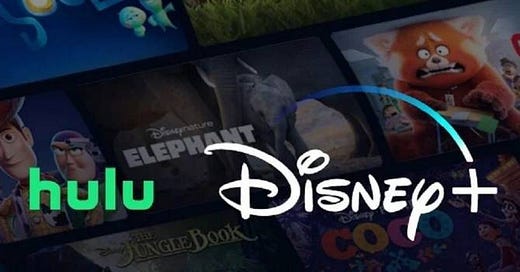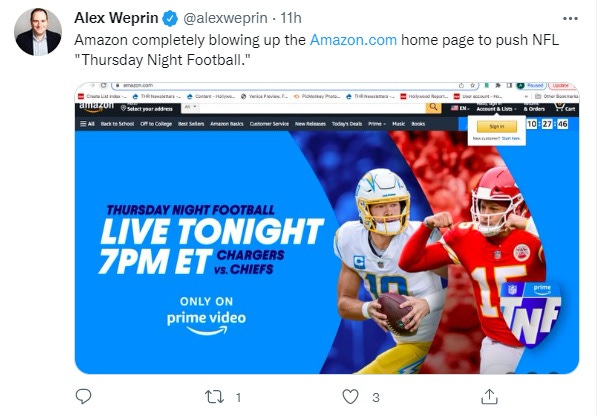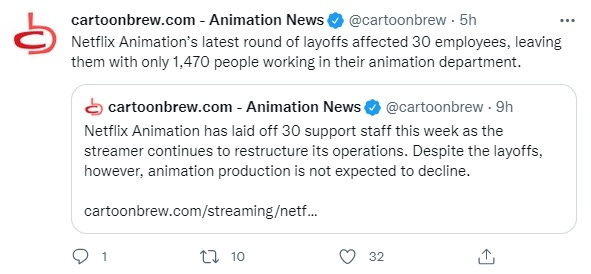Too Much TV: Your TV Talking Points For Thursday, September 15th, 2022
Does it matter what time of the day a streaming show premieres?
Here's everything you need to know about the world of television for Thursday, September 15th, 2022.
COMCAST CEO BRIAN ROBERTS TRIES SOME JEDI MIND GAMES WHEN TALKING ABOUT HULU
After months of doing a bit of a dance about whether Disney plans to roll Hulu into Disney+, CEO Bob Chapek said on Wednesday that once the company controls all of Hulu, he sees an integration of the two services as almost inevitable. He also mentioned that - if the price was right - Disney would be interested in acquiring the 33 percent of Hulu still owned by Comcast.
In a separate speech on Wednesday, Comcast CEO Brian Roberts countered that, well actually, Comcast thinks Hulu is a pretty good business. And if Disney was willing to put the service on the open market, Comcast might be interested in acquiring the while thing:
“Hulu is fantastic, it has a wonderful platform, and I believe if it was for sale, put up for sale [by Disney], Comcast would be interested, but so would a lot of other tech and media companies,” Roberts said at the Goldman Sachs Communicopia + Technology Conference this week.
Whether Roberts statements are a negotiating tactic or real interest remain to be seen. “I think Hulu's got tremendous value, and I'm sure our shareholders share that belief,” he said. “Our position is a very enviable one."
His statements have sparked a round of stories today suggesting Disney and Comcast are now going to be "battling" over Hulu. Which I think misses the entire point of Roberts' Jedi mind game comments.
Roberts is correct when he says that Comcast is in an enviable spot when it comes to Hulu. Currently, Comcast and Disney are working under the terms of a mutual agreement in which Disney could potentially acquire Comcast’s minority stake in Hulu in 2024. But Comcast isn't required to sell to Disney. If it does, Disney is required to pay Comcast a fair-market value for the one third of Hulu, based on a third party evaluation of the streamer's value.
The problem for Comcast is that Disney seems to have been purposely putting less effort into Hulu than it normally would, in an effort to keep the overall value of the service as low as possible until 2024. The other problem for Comcast is that no one really knows what the value of a service such as Hulu might be on the open market. There has never been a service available before with this scale and subscriber base. So how does Comcast ensure that it gets every drop of money from Disney it can under these constraints?
Well, Roberts is hoping that by making these comments, he can spur some talk about whether Disney should sell Hulu. It's extremely unlikely Disney would choose to do so, but the speculation would spark some outside estimates on the value of Hulu which Comcast could use as an indication of the streamer's value in 2024. Given the level of Comcast debt and the clunky content licensing issues involved with acquiring Hulu, it's unlikely Comcast is seriously considering an offer. But Roberts wouldn't mind having someone publicly kick the tires and put together an accurate estimate of Hulu's value.
This all might seem like a lot of work and machinations back-and-forth. But we are talking about massive numbers no matter how the deal shakes out. Under the terms of the agreement, Disney guaranteed a minimum total equity value of Hulu in 2024 of $27.5 billion. That figure seems extremely low in today's market. A 2021 analyst report estimated the value of Hulu at that time at $45 billion. And based on subscriber growth and Hulu's strong ARPU (average revenue per user), a $55-$60 billion valuation in 2024 doesn't seem out of the question.
So what is going to happen in 2024? At this point, I don't think either Chapek or Roberts knows for certain. There's a chance Comcast may opt to hold on to its ownership share in Hulu, given that the company is apparently making some money from the current situation. But even more importantly, retaining control of Hulu would frustrate Disney's apparent plan to eventually roll Hulu into Disney+. So the calculation for Comcast is whether it's worth walking away from Hulu with a big paycheck or making much less money while simultaneously hobbling a competitor.
Decisions, decisions.
DOES IT MATTER WHAT TIME OF THE DAY A STREAMING SHOW PREMIERES?
I got into a bit of a back-and-forth on social media a few days ago about whether it was a good idea that streamers tend to premiere new programs in the United States at midnight Pacific Time rather than at some "normal" time such as 9:00 pm.
There are a couple of things at play in this discussion. There is always a bit of "well, I'm normal and this is what I would like. So this is what Netflix/Amazon/HBO Max should do!" Which is a valid enough point of view, but it also isn't especially scientific.
I also hear a lot of comments along the lines of "HBO shows premiere at that time and they do extremely well, so why wouldn't every show have the same response?" Well, my snarky answer would be that most shows are not House Of The Dragon. But that answer also is a truthful one. Streamers can't make decisions based on the outliers. Opting to premiere streaming shows at 9:00 pm because it works for House Of The Dragon is a bit like deciding to release every show on a one-episode-a-week basis because it worked well for The Mandalorian.
From what I can tell, some of the reasoning behind the midnight U.S. premiere is driven by "this is the way we've always done it," but talking to people at Netflix and Amazon this week, there also is a lot of strategy behind the decision. Streamers tend to depend a great deal on word-of-mouth and social media buzz to drive content discovery on titles that aren't considered buzzworthy for other reasons - recognizable names or IP, for instance. And there is a strong belief - especially at Netflix - that the very early release time helps drive the buzz.
I recently had a long conversation at Netflix with someone who walked me through the data for several recent shows, including the recently released Devil In Ohio. That show in particular is an interesting case study, because it received almost no press ahead of the premiere. But looking at the data, you can see subscribers slowly discovering the show, discussing it on social media and then driving more people to watch. The show then starts popping up on Netflix's just released section and then within several days on various top ten lists. It's not organic growth per se, but it is also the best case scenario for how a release should happen.
The person who shared the data with me on background did so because they had seen the discussion on Twitter and wanted to provide me with a bit of context. And while my discussion with someone at Amazon was done off-the-record, I can at least say that what I was was told seems to match the Netflix data.
To be fair, this type of rollout doesn't work with a lot of titles. And some very good ones end up being overlooked because this promotional flywheel falls apart at some point in the process. But it is an indication of why many people working at streamers aren't concerned with releases in the U.S. taking place very early in the morning.
I mentioned the complaint that I heard from several people that by releasing a show early in the morning, it meant there was less of a social media event for the premiere and it somehow felt less special. The response I heard was that for most shows - especially those that are dropped on a binge release schedule - it's not that the buzz is gone for the shows. It's that the buzz is diffused across friends, family and social media. And that type of buzz tends to feel more authentic and organic than the reaction that comes because a bunch of viewers are watching together at a specific time.
What is your thought on this issue? Respond directly to this newsletter or post a comment below.
TWEET (S) OF THE DAY
ODDS AND SODS
* Saturday Night Live adds four featured players for the new season: Marcello Hernandez, Molly Kearney, Michael Longfellow and Devon Walker
* Former Netflix Exec Carla Engelbrecht is joining subscription book company Literati as Chief Product Officer.
* The new streaming service Cineverse has episodes of the short-lived 1966 talk show The Joe Pyne Show, which is....something else. It also has episodes of the 1960 series Country Style U.S.A., which was sponsored by the U.S. Army and featured top country and western singers playing their hit songs interspersed with announcements urging viewers to visit their local Army recruiting station.
* G4TV hit with major layoffs less than a year after coming back to life.
* Blade Runner 2099, Amazon Studios' live-action series set in the Blade Runner universe, has been picked up to series for Prime Video.
* Amazon has also picked up a series that is apparently loosely based on the movie Butch Cassidy & The Sundance Kid, although it reportedly may be set in an alternate history and involves other planned spin-offs. So who knows what this will look like when it airs.
* Fans have been asking for months & now Disney+ is adding the first two seasons of Zorro in the U.S. on 10/5. On the kids side, the first four seasons of Bear in the Big Blue House & the first three seasons of PB&J Otter are coming on 10/19.
WHAT'S NEW FOR THURSDAY
Here's a quick rundown of all the new stuff premiering today on TV and streaming:
Atlanta Season Premiere (FX)
Bastard!! Heavy Metal, Dark Fantasy (Netflix)
Dogs In Space (Netflix)
Fate Of A Sport (ESPN)
Ghost Adventures Season Premiere (Travel)
Messyness (MTV)
Speak No Evil (Shudder)
Terim (Netflix)
The Light In The Hall (Sundance Now)
Thursday Night Football Season Premiere (Prime Video)
Vampire Academy (Peacock)
Click Here to see the list of all of the upcoming premiere dates for the next few months.
SEE YOU FRIDAY!
If you have any feedback, send it along to Rick@AllYourScreens.com and follow me on Twitter @aysrick.






No data and just personal preference, but I’d throw shows on streamers around 6 ET (on weekdays, maybe delay a couple hours on Sundays). The slow build up you mention when released at midnight PT happens over the course of days so I guess I struggle, without seeing the data, to understand how you can tie that to the midnight release. And I don’t think a show needs to be GoT to be able to create “appointment viewing” buzz around them. Fandoms exist in small pockets everywhere (I know people who stayed up to watch Gilmore Girls at midnight for example). The other thing this makes me think about is Netflix (and some others) are terrible at showing you an up-to-date New Releases section, but that’s a different topic.